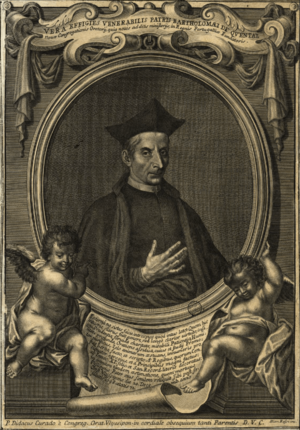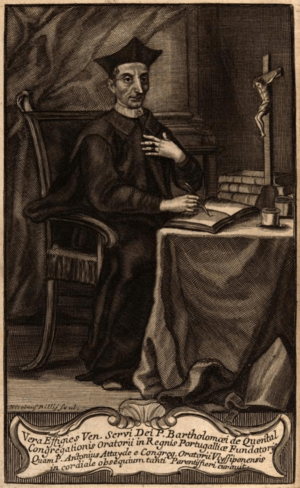Bartolomeu de Quental facts for kids
Quick facts for kids Bartolomeu de Quental |
|
|---|---|
| Preacher of the Royal Chapel and Chaplain-Confessor of the Royal Household | |

Engraved portrait of Bartolomeu de Quental, Girolamo Rossi, National Library of Portugal
|
|
| Church | Roman Catholic Church |
| Diocese | Archdiocese of Lisbon |
| Personal details | |
| Born | 22 August 1626 Fenais da Luz, São Miguel, Azores, Portugal |
| Died | 20 December 1698 (aged 72) Lisbon, Portugal |
| Alma mater | University of Évora |
Bartolomeu de Quental (born August 22, 1626 – died December 20, 1698) was a Portuguese Catholic priest and a very good speaker. He was also a theologian, which means he studied religious ideas deeply.
Quental started the first group of the Congregation of the Oratory of Saint Philip in Portugal in 1668. This was a special religious community. After he died, people wanted him to become a saint. In 1748, Pope Benedict XIV said that Quental lived a life of "heroic virtue". This means he was very good and holy. Since then, he has been called "venerable".
Contents
Early Life and Studies
Bartolomeu de Quental was born in Fenais da Luz, on São Miguel Island in the Azores. This was on August 22, 1626. His parents were Francisco de Andrade Cabral and Ana de Quental Novais. He was named Bartolomeu because his birthday was close to the feast day of Saint Bartholomew. His family was very Catholic.
Bartolomeu was a very smart student. He learned Latin well and finished his grammar studies by age twelve. This was earlier than most kids his age. Usually, the oldest son would go on to study more. His older brother, Pedro, was supposed to go to Mainland Portugal to study. But Pedro let Bartolomeu go instead.
At 16, Bartolomeu arrived in Lisbon. He then went to Évora to study at the University of Évora, which was run by the Jesuits. He earned a master's degree in Philosophy in 1647. He then got his bachelor's, licentiate, and doctorate degrees in Philosophy. Around the same time, he began studying Theology.
In 1650, he went to the University of Coimbra. He became a deacon and was known as a great speaker. Soon, he was asked to give important speeches at the royal court. People thought he was the second-best public speaker in Portugal, after another famous priest named António Vieira.
Becoming a Priest and Royal Preacher
Bartolomeu de Quental became a priest in 1652. He was ordained by Bishop Francisco de Sotomayor in Lisbon. For the next two years, he worked hard helping people in different cities and towns. He wanted to understand what people needed.
In 1654, he asked to be the parish priest in Ribeira Grande, near his hometown. He got the job but soon quit. His biographers believe he wanted to do missionary work instead. Missionary work meant traveling to help people and spread the faith, which was different from being a local parish priest.
On October 22, 1654, King John IV gave Father Bartolomeu de Quental an important job. He became a preacher for the Royal Chapel and a Chaplain-Confessor for the Royal Household. This was surprising because he was only 27 years old. But he was already famous in Lisbon for his wise speeches.
Quental was a popular chaplain and confessor at court. Many people came to hear his sermons. Noble ladies at court attended his morning prayers and evening spiritual exercises. He helped improve the behavior and religious devotion at court. Many people said that the ladies-in-waiting of Queen Luisa de Guzmán were as good and religious as nuns. One of the people who often attended his events was Catherine of Braganza. She later became the Queen of England. Her strong Catholic faith, which Quental helped strengthen, made her unpopular in England.
Starting the Oratory Congregation
At this time, Portugal was fighting a long and difficult war against Spain. This war made the country poor. Quental wanted to help the clergy (priests and religious leaders) become better prepared. He also wanted to help them do their jobs with more respect.
Between 1657 and 1658, Quental tried to bring together priests from the Royal Chapel. He wanted them to form a small group of "devout priests eager to help people's souls." He faced some challenges, but in 1659, he started a religious group called the Confraternity of Our Lady of Saudades. This group focused on helping others and doing good deeds. Queen Luisa de Guzmán approved it on February 18, 1659.
In 1664, Quental left his job as court confessor. He wanted to focus on missionary work with poor people in the countryside. He would wake up early for prayer and Mass. Then he would spend almost all day hearing confessions. In the late afternoon, he would preach and lead group prayers. He was so busy that he sometimes slept in churches, wrapped only in his cape.
There were also political problems during the reign of King Afonso VI. Quental had criticized the young king's bad behavior in his sermons. When the king's brother, Infante Peter, took power in 1668, Quental was asked to return to the Royal Chapel. But he said no.
Instead, he decided to start a formal religious group. He was inspired by the Congregation of the Oratory that Saint Philip Neri had started in Rome in 1575. Quental got permission from the Church in Lisbon on January 8, 1668. The king gave his approval on March 23, 1668.
Quental's new group, the Portuguese Oratorians, took ideas from both the Italian and French Oratorians. Like the Italians, they focused on charity, prayer, and not having strict vows. Like the French, they had a more organized structure. Their rules were officially approved by Pope Clement X on August 24, 1672.
Death and Lasting Impact
Bartolomeu de Quental died on December 20, 1698. Many people believed he was a very holy person. After he died, the Oratorian Fathers tried to have him recognized as a saint. This process officially began around 1720.
The Oratorians used the fact that Quental had been a preacher at court to get support from the king. In 1733, Father António de Ataíde went to Rome to work on the process of making Quental a saint. It was around this time that the first book about Quental's life was written.
In 1748, Pope Benedict XIV officially said that Quental had lived a life of "heroic virtue". This was a big step towards becoming a saint. Since then, he has been called "Venerable". However, the process of making him a saint stopped in the second half of the 18th century. This was partly because of the Marquis of Pombal and the weakening of the Oratory Congregation in Portugal.
Images for kids
See also
 In Spanish: Bartolomeu do Quental para niños
In Spanish: Bartolomeu do Quental para niños
 | Calvin Brent |
 | Walter T. Bailey |
 | Martha Cassell Thompson |
 | Alberta Jeannette Cassell |



